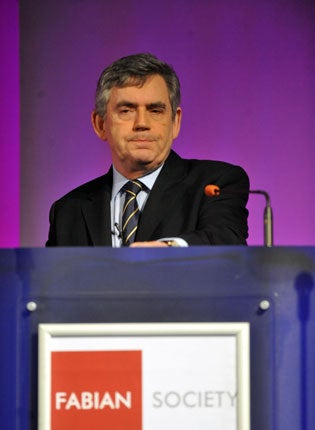Labour is weak and dysfunctional, say civil servants
Report claims Number 10 is unable to put its plans into action

Gordon Brown used a secret fund to finance his campaign to replace Tony Blair as Labour's leader, the man who used to run the party claims. Peter Watt, Labour's former general secretary, said Mr Brown used up to £50,000 a year on private polling that was never shared with the party, a pot that became known by insiders as "the fund with no name". The Tories have demanded that the Prime Minister clarify why the funds were not made public.
And Mr Brown's leadership came under further criticism, as senior Whitehall figures accused his Government of being "dysfunctional" and "weak" in a damaging assessment of the performance of No 10.
The report by the independent Institute for Government, based on the anonymous testimony of 60 senior civil servants, found that there was a "strategic gap" at the heart of Mr Brown's administration. It stated that major reforms were needed to repair Whitehall if it was to function properly after the next general election. "The fragmentation and lack of coordination at the centre of the Civil Service – the Treasury, No 10 and the Cabinet Office – leads to an administrative centre that is relatively weak," it states. "This curious situation has created a strategic gap at the heart of British government, which inhibits the ability to set overall government priorities and translate them into action."
Mr Watt, in a second week of damning claims made in his hard-hitting book on life inside New Labour, serialised in the The Mail on Sunday, said Mr Brown had demanded and received funds for his own private polling.
"When I took over as finance director in 2005, I was given an exercise book with a record of his deposits and withdrawals," he wrote. "All we at HQ knew was that it was for Gordon's private polling. I never asked for more detail, so I don't know if that polling was to inform Budget decisions, or for his long campaign to become party leader." He added: "Technically, there was nothing improper about it, but it always seemed strange that he should have his own stash of cash."
A Labour spokesman confirmed there was nothing improper about the fund. "The money was mainly used for polling on Labour's electoral message," he said. "It was funded through donations to the party." But the Tories believe that Mr Brown may have broken parliamentary rules by not recording the fund on the Register of Members' Interests. Greg Hands, a shadow Treasury minister, has written to the Prime Minister asking him to clarify "on what basis" he judged that it was unnecessary to declare the fund.
"As a matter of public interest, I believe it is important that you clarify these issues urgently as I believe there may be grounds for investigation by the Parliamentary Commissioner for Standards," Mr Hands wrote.
Mr Watt said yesterday that the party's finances became so precarious that he was forced to examine what to do in the event it was declared bankrupt. "We looked at that, because there were times when it was a very real possibility," he said. "There is a plan for a much shrunken party, which we drew up while I was there."
Mr Watt resigned from his post in 2007 after controversy over anonymous donations made to the Labour Party by the businessman David Abrahams. He accused Mr Brown of "hanging him out to dry" on the issue.
Other revelations in his book include the claim that both Mr Brown and Mr Blair appeared to be horrified when Harriet Harman won the contest to become Labour's deputy leader in 2007. "There was some shock when she became deputy leader," he said yesterday.
*An independent commission is to be set up to monitor the progress made by the Government in helping students from poor backgrounds find jobs in top professions. The new Social Mobility Commission is understood to be among measures to be announced by the Government today in response to a study by the Labour MP, Alan Milburn. His report found there was still a glass ceiling blocking children from poorer backgrounds from professions such as medicine, law and journalism. Universities may be asked to use more data on the backgrounds of prospective candidates when allocating places on their courses.
Subscribe to Independent Premium to bookmark this article
Want to bookmark your favourite articles and stories to read or reference later? Start your Independent Premium subscription today.

Join our commenting forum
Join thought-provoking conversations, follow other Independent readers and see their replies